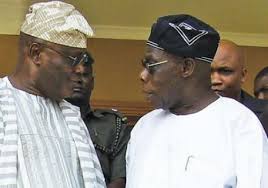Nigeria’s former ruler Olusegun Obasanjo on Thursday backed his ex deputy to beat incumbent Muhammadu Buhari in elections next year, in a cautious endorsement after a years-long feud.
Atiku Abubakar, who is referred to across Nigeria by his first name, was Obasanjo’s deputy from the return of civilian rule in 1999 until 2007.
Their relationship soured over Obasanjo’s bid to change the constitution to allow him to seek a third term of office, and Abubakar’s desire to replace him as head of state.
But in an apparent rapprochement, the ageing pair met in Obasanjo’s home town of Abeokuta, in southwest Nigeria, less than a week after Abubakar won the nomination to run against Buhari for the main opposition Peoples Democratic Party (PDP).
“You have the capacity to perform better than the incumbent,” Obasanjo told Abubakar, describing him as “president-to-be”.
“You surely understand the economy better, you have business experience, which can make your administration business-friendly and boost the economy and provide jobs.”
Towards the end of Obasanjo’s time as president, the pair traded accusations and counter-accusations, supported by documents purportedly showing massive corruption on both sides.
But on Thursday, Obasanjo said the pair had “reviewed what went wrong” and he had accepted Abubakar’s “remorse” and his request for “forgiveness”.
“I forgive and I sincerely advise you to learn from the past and do what is right and it will be well with you,” he added.
Obasanjo, 81, is a former military ruler like Buhari but the pair have not been on good terms and in January this year he said the president should not stand for a second term.
Before the last election in 2015, Obasanjo also fell out with the then-president Goodluck Jonathan and famously ripped up his PDP membership card.
He claimed Jonathan was trying to stay in power “by hook or by crook”, questioned his fitness to govern and said he was surrounded by corrupt cronies and “greedy hangers-on”.
Abubakar’s victory in the PDP presidential primary on Sunday comes at the fourth time of asking.
But questions about the 71-year-old’s business interests and repeat allegations of corruption — which he has denied — could potentially harm his ambitions in a country fed up with graft.














